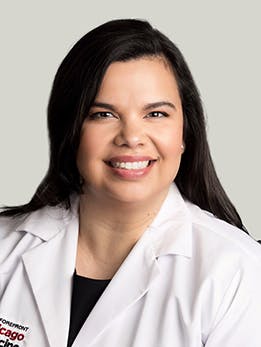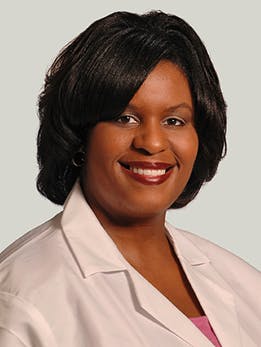Can I have a baby if I have fibroids?

Fibroids — and some treatments for fibroids — can affect your fertility. At the University of Chicago Medicine, we can help you understand the potential impact of your fibroids on future pregnancies and offer solutions to maintain your fertility.
Fibroids, Fertility and Infertility
Can you still be fertile with fibroids?
Yes, many patients with fibroids can get pregnant. But to improve your chances of a healthy pregnancy, it’s best to discuss your goals and priorities with your doctor. If fibroids are having an impact on your quality of life, a gynecologic surgeon can discuss treatment options that can help preserve your fertility.
Can fibroids cause infertility?
Some types of fibroids may have an impact on fertility. For example, fibroids that bulge into the center of the uterus can make it more difficult for an embryo to implant into the lining of the uterus.
If you have fibroids and are having trouble getting pregnant, there might be a correlation. However, it is important to see a reproductive endocrinologist (fertility specialist) to rule out other possible causes of infertility before determining that fibroids are the main reason.
Does removing fibroids improve fertility?
For some patients, removing fibroids with uterus-sparing treatments may improve fertility. However, the main objective of fibroid removal is to alleviate symptoms such as heavy bleeding and bloating.
Can you get fertility treatment with fibroids?
Absolutely. At UChicago Medicine, gynecologic surgeons trained in minimally invasive techniques will review your case with fertility specialists to determine which treatments will be best to help you reach your goals.
Can you freeze your eggs with fibroids?
Yes. In fact, we offer this and other fertility preservation services for patients who may still want to become pregnant after having certain fibroid treatments. Planning ahead is important because having a hysterectomy means a patient can no longer become pregnant, while the impact of other treatments like uterine fibroid embolization on fertility is unknown.
Pregnancy, Labor and Delivery with Fibroids
Can you carry a baby with fibroids?
Many patients with fibroids have safe and healthy pregnancies. However, the size, location and number of fibroids can affect pregnancy outcomes. Some patients with fibroids may have a premature delivery or need a cesarean section (C-section). Fibroids have also been linked to miscarriage.
For these reasons, it is important to talk with an obstetrician/gynecologist to get a better sense of how your fibroids may affect a future pregnancy.
What fibroid treatments can help me maintain my fertility?
For younger patients with fibroids who want to maintain their fertility, the gold standard treatment is called myomectomy. Unlike a hysterectomy, a myomectomy spares your uterus, so you can still become pregnant after the procedure. Myomectomy may be completed through a single large incision or preferably through a minimally invasive approach.
Several factors determine if you are a candidate for myomectomy. These include:
- The location of your fibroid(s) in your uterus
- The size of your fibroid(s)
- The number of fibroids you have
- Your age
- Your overall health
At the Center for the Advanced Treatment and Research (CATeR) of Uterine Fibroids, our experts are highly skilled in performing robotic and laparoscopic myomectomies that only require a few small incisions. We also offer hysteroscopic myomectomy, which does not require any visible incisions. At times, a single large incision is the best and safest way to perform a myomectomy, and physicians at UChicago Medicine are skilled in this approach as well.
Are fibroids considered high-risk during pregnancy?
Sometimes, fibroids can grow during pregnancy, which can put the patient at risk for premature delivery or pregnancy loss.
If your pregnancy is considered high risk because of fibroids or any other reason, our OB/GYNs and maternal-fetal medicine specialists will work together on a care plan to reduce the risks to you and your baby.
How do you treat or remove fibroids during pregnancy?
We do not remove fibroids during pregnancy, but we can help you manage the symptoms.
You can remove fibroids before you become pregnant or after your delivery with a surgery called a myomectomy. That is why we recommend working with your care team to develop the best plan for you.
Can you have a “normal” or “natural” delivery with fibroids?
Most patients with fibroids can have a natural birth (delivery through the vagina). However, fibroids do increase the risk for a C-section. Patients with fibroids are six times more likely to need a C-section, compared with pregnant patients without fibroids.
Do fibroids go away on their own after pregnancy?
Many times, fibroids grow in pregnancy, and they often regress after delivery. But for some patients, fibroids continue to cause frustrating symptoms like heavy menstrual bleeding. If you continue to have these symptoms, treatments are available that can help. These include procedures that can maintain your fertility if you want to become pregnant again in the future.



